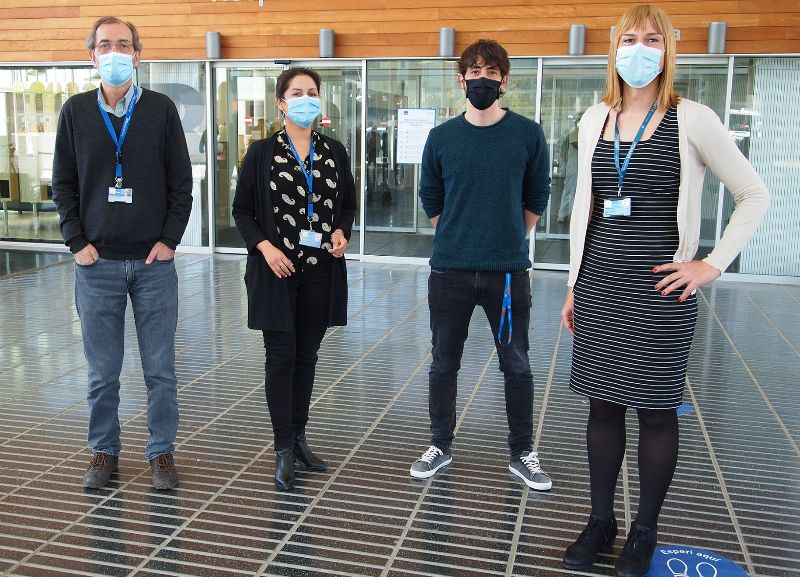
08/04/2021 - Press release
This is the first model enabling individualised prediction of the risk of developing breast cancer over a 20-year period
Doctors and researchers at Hospital del Mar and the Hospital del Mar Medical Research Institute (IMIM) have developed and validated a new risk model for breast cancer screening, based on four variables. This is the first time that it has been possible to predict the risk of developing this pathology in the long term, up to twenty years. The study, which has just been published in the journal PLOS ONE, examined data from almost 122,000 women who received a screening mammogram at the Hospital de la Santa Creu i Sant Pau between 1995 and 2015. This study is a continuation of the population-based breast cancer screening research led by Dr. Xavier Castells, head of the Epidemiology and Evaluation Service at Hospital del Mar.
Current models allow a woman's risk of developing this disease to be predicted over a maximum of two, five, or ten years, and these models have not generally been oriented towards women who are screened for breast cancer. The researchers' approach takes into account the women's age and family background, as well as benign breast lesions and the presence of any suspicious patterns in previous imaging tests, to establish the risk of developing breast cancer over a time horizon ranging from two to 20 years. "The model makes it possible, for the first time, to predict the risk of developing the disease at two-year intervals, up to 20 years, when previous models generally had a predictive capacity for just a single time horizon", explains the study's first author, Javier Louro, a mathematician and pre-doctoral researcher in the Epidemiology and Evaluation Research Group at the IMIM-Hospital del Mar.
This fact may make it possible to adapt patient follow-up according to their risk, by personalising the frequency of screening tests, which are now carried out every two years for all women between the ages of 50 and 69. "Currently, breast cancer screening treats all women between the ages of 50 and 69 in the same way. However, within this group there are women who, depending on their characteristics, may be more at risk of suffering from the disease than others. They are variables that need to be taken into account", stresses the first author of the paper. A novel feature of the model is that it has been developed to specifically take into account the characteristics of women of screening age. It has a discrimination capacity of up to 64%, although the authors are analysing another variable, breast density, to further increase the predictive capacity.

Research team. Source: Hospital del Mar.
Twenty years of data
The researchers were able to analyse 20 years of screening programme data, with an average follow-up time of 7.5 years for the women in the programmes. Of the 122,000 women who were screened, 2,058 went on to develop breast cancer. The analysis reveals that the highest risk was detected in those with a family history of the disease, benign proliferative lesions and active calcifications. The study follows the guidelines set out by the European Conference on Personalised Early Detection and Prevention of Breast Cancer (ENVISION), for the personalisation of screening programmes. In addition to enabling the frequency of the tests to be varied according to the patients' individual risk, it may also allow the type of diagnostic test used to be adapted in each case. Dr. Marta Román, principal investigator on the project and a member of the Epidemiology and Evaluation Service at the Hospital del Mar, emphasises that this study "provides essential information when considering more personalised follow-ups for women participating in mammography screening. Women at higher risk could be offered a mammogram each year or an MRI scan, which is more accurate, instead of a mammogram every two years. Conversely, for lower-risk participants, the time between tests could be extended”. Reference article Developing and validating an individualized breast cancer risk prediction model for women attending breast cancer screening. Louro J, Román M, Posso M, Vázquez I, Saladié F, et al. (2021). PLOS ONE 16(3): e0248930. https://doi.org/10.1371/journal.pone.0248930
Servei de Comunicació:
Marta Calsina Freixas(ELIMINAR)
Tel:
(+34) 93 316 06 80
Doctor Aiguader, 88
08226 Barcelona
© Institut Hospital del Mar
d'Investigacions MèdiquesLegal Notice and Privacy Policy | Cookie Policy | Site Index | Accessibility | Find Us | Contact